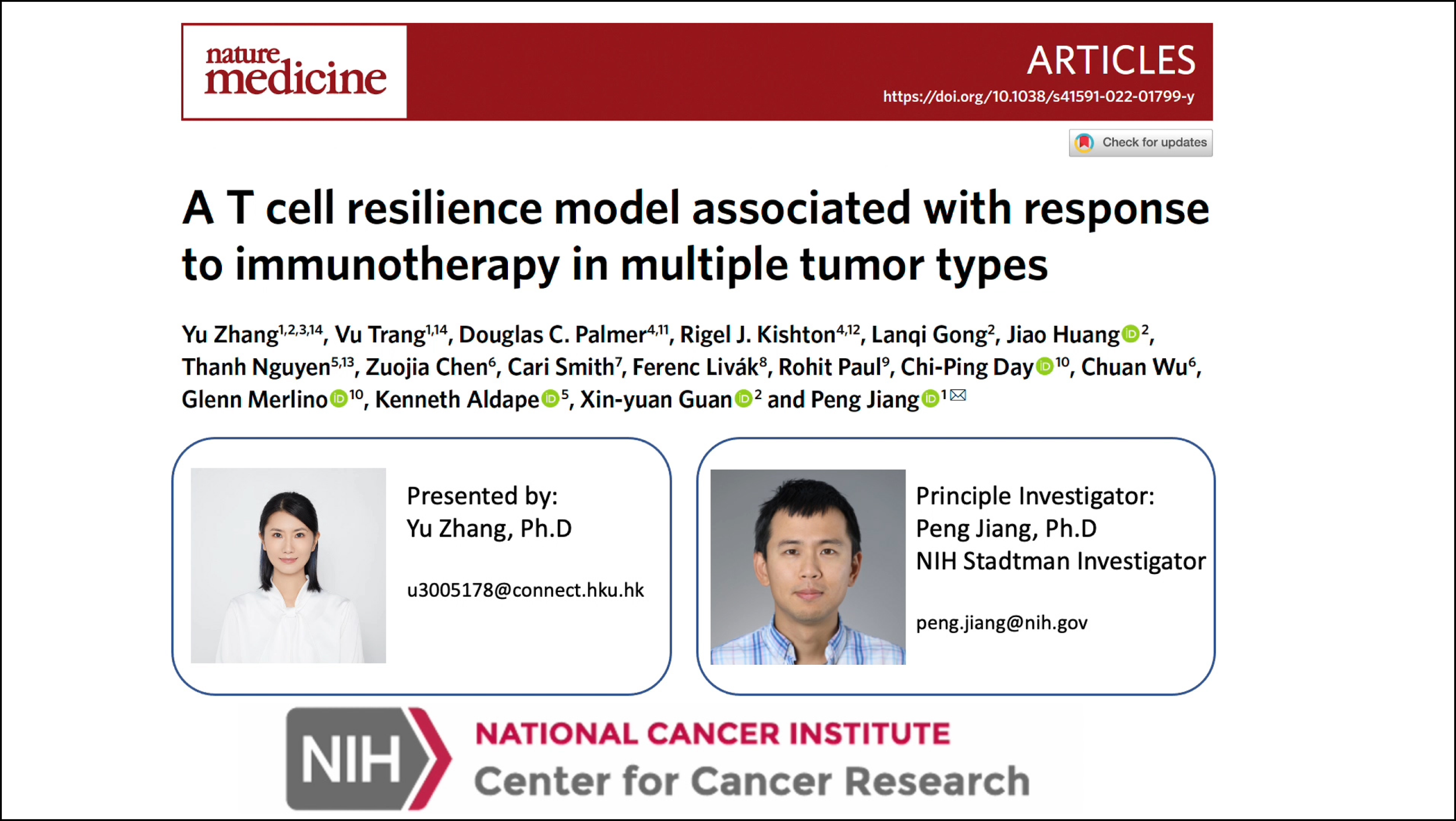A T cell resilience model associated with response to immunotherapy in multiple tumor types
Yu Zhang1,2,3, Trang Vu1, Douglas C Palmer4,5, Rigel J Kishton4,6, Lanqi Gong2, Jiao Huang2, Thanh Nguyen7,8, Zuojia Chen9, Cari Smith10, Ferenc Livák11, Rohit Paul12, Chi-Ping Day13, Chuan Wu9, Glenn Merlino13, Kenneth Aldape7, Xin-Yuan Guan2, Peng Jiang14
- Cancer Data Science Laboratory, Center for Cancer Research, National Cancer Institute, National Institutes of Health, Bethesda, MD, USA.
- Department of Clinical Oncology, The University of Hong Kong, Hong Kong, China.
- Sun Yat-sen University Cancer Center, State Key Laboratory of Oncology in South China, Collaborative Innovation Center for Cancer Medicine, Guangzhou, China.
- Surgery Branch, National Cancer Institute, National Institutes of Health, Bethesda, MD, USA.
- AstraZeneca, Gaithersburg, MD, USA.
- Lyell Immunopharma, South San Francisco, CA, USA.
- Laboratory of Pathology, Center for Cancer Research, National Cancer Institute, National Institutes of Health, Bethesda, MD, USA.
- Gaia Foods, Singapore, Singapore.
- Experimental Immunology Branch, Center for Cancer Research, National Cancer Institute, National Institutes of Health, Bethesda, MD, USA.
- Laboratory Animal Science Program, Leidos Biomedical Research Inc, Frederick, MD, USA.
- Flow Cytometry Core, Center for Cancer Research, National Cancer Institute, National Institutes of Health, Bethesda, MD, USA.
- Office of the Director, Center for Cancer Research, National Cancer Institute, National Institutes of Health, Bethesda, MD, USA.
- Laboratory of Cancer Biology and Genetics, Center for Cancer Research, National Cancer Institute, National Institutes of Health, Bethesda, MD, USA.
- Cancer Data Science Laboratory, Center for Cancer Research, National Cancer Institute, National Institutes of Health, Bethesda, MD, USA. peng.jiang@nih.gov.
Abstract
Despite breakthroughs in cancer immunotherapy, most tumor-reactive T cells cannot persist in solid tumors due to an immunosuppressive environment. We developed Tres (tumor-resilient T cell), a computational model utilizing single-cell transcriptomic data to identify signatures of T cells that are resilient to immunosuppressive signals, such as transforming growth factor-β1, tumor necrosis factor-related apoptosis-inducing ligand and prostaglandin E2. Tres reliably predicts clinical responses to immunotherapy in melanoma, lung cancer, triple-negative breast cancer and B cell malignancies using bulk T cell transcriptomic data from pre-treatment tumors from patients who received immune-checkpoint inhibitors (n = 38), infusion products for chimeric antigen receptor T cell therapies (n = 34) and pre-manufacture samples for chimeric antigen receptor T cell or tumor-infiltrating lymphocyte therapies (n = 84). Further, Tres identified FIBP, whose functions are largely unknown, as the top negative marker of tumor-resilient T cells across many solid tumor types. FIBP knockouts in murine and human donor CD8+ T cells significantly enhanced T cell-mediated cancer killing in in vitro co-cultures. Further, Fibp knockout in murine T cells potentiated the in vivo efficacy of adoptive cell transfer in the B16 tumor model. Fibp knockout T cells exhibit reduced cholesterol metabolism, which inhibits effector T cell function. These results demonstrate the utility of Tres in identifying biomarkers of T cell effectiveness and potential therapeutic targets for immunotherapies in solid tumors.
Presented By Yu Zhang

